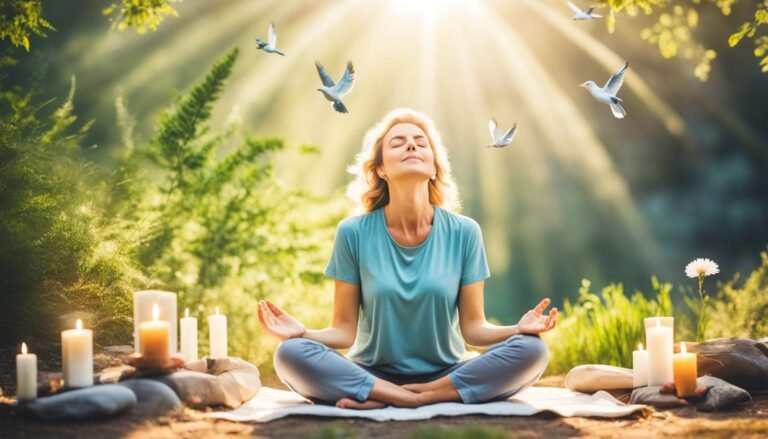How to improve mental wellness?
Imagine starting each day feeling fulfilled and happy. That’s not far from reality. By finding joy and dealing with challenges, we can truly improve our mental health. It’s about more than just being happy. It’s making real, lasting changes. How do we find that balance and bring more happiness into our lives?
Building strong relationships is key. Feeling loved and valued by others is essential1. Especially important is this in places like South Africa, where community bonds run deep1. Good relationships not only make us feel like we belong, but they also uplift our spirits through shared moments and support.
Being physically active is another important step. Moving your body can make you feel better about yourself, help you reach goals, and boost your mood1. Do something active for 30 minutes most days2. It will do wonders for your mental and emotional wellbeing, proving simple actions can be very effective.
Learning new things brings value to our lives. It might be a hobby or some extra studying. This learning journey boosts confidence, gives purpose, and widens our social circles, hence improving our mental state1. Feeling like you’re growing and achieving makes a big difference for our mental wellness3.
Giving and being kind has a ripple effect. It’s not just good for others; it does us good too1. Small acts, like lending a hand to someone or volunteering, can significantly enhance our mental health1. Finally, by being mindful, we learn to be present, appreciating life more and understanding ourselves better1.
Key Takeaways
- Good relationships build a sense of belonging and self-worth1.
- Being physically active positively affects mood and self-esteem12.
- Learning new skills can provide a sense of purpose and improve mental wellbeing1.
- Acts of giving and kindness promote emotional connectedness and self-worth1.
- Mindfulness enhances appreciation of life and self-understanding1.
Understanding Mental Wellness
Mental wellness involves how we feel, think, and relate to others. It helps us handle life’s ups and downs well. Improving how we see mental health can make young people feel better and think clearer.
Our mental health is closely connected to our physical health and how we get along with others. It’s important at every stage of life. It affects how well we handle stress, make decisions, and build relationships. For instance, students in New York found that learning to deal with stress in school made them feel better overall4.
Talking about mental health and promoting emotional well-being creates a place where people are not afraid to get help. A director in Mississippi said that mental health programs really help students feel well4.
South Africa could learn a lot from such programs. They focus on emotional health and building good friendships. Learning new things or picking up a hobby can boost how we think and make us feel better5.
| Course Details | Data |
|---|---|
| Grade Level | 8-12 |
| Length of the Course | 6 digital lessons, 15 minutes each |
| Languages Offered | English, French, Spanish |
| Curriculum Fit | Health, Counseling, Advisory, Homeroom |
| Number of Lessons | 6 |
| Number of Coping Strategies | 5 |
Connect with Others
It’s vital to have good relationships for our mental health. Feeling like we belong and are valued is key to being happy. Studies show that people who are happy usually have strong social ties6.
So, it’s important to strengthen our ties with family and engage in the community. Doing activities together can also make our relationships better6.
Building Meaningful Relationships
Spending time to build and keep relationships makes us feel better about ourselves6. Doing things like having dinner with family or joining community events can boost our connections. Time with friends also helps our health, both body and mind7.
Those with strong social ties are less likely to die young8. This shows how important our friends and community are for a long life.

Fighting fairly in relationships can lead to better mental health outcomes8. Doing things like joining groups or going out with friends shows we have support. This emotional support is crucial for our wellbeing8.
Strong relationships let us share both good and tough times. This sharing helps us become stronger and grow personally.
Leveraging Technology
While nothing beats face-to-face talks, using tech wisely can help keep us close. Apps like Skype and FaceTime are great for keeping in touch, no matter how far apart. But balancing tech time with real meetings is important for true connections6.
In South Africa, using tech well is becoming a big deal. It’s about finding the right mix of social media and real-life friend time.
Many young people find comfort in tech, like talking on the phone or gaming7. The BeReal app aims for true connections, which can help with self-care7. But it’s also key not to rely on tech too much. A mix of online and face-to-face is best for our mental health.
Stay Physically Active
Being active is key for our health and happiness. It boosts our fitness and makes us feel good. A South Africa lifestyle should include regular exercise for better physical and mental health.

Benefits of Physical Activity
Even a small amount of daily walking can lower the risk of depression by 26%9. Adults should aim to do 150 minutes of moderate exercise every week. Or they can do 75 minutes of intense exercise per week10. These efforts help fight tiredness and increase our energy9.
It’s best to do exercises that make us breathe harder but not too hard. Activities like running or lifting weights keep us strong and happy. They also help our bodies make chemicals that make us feel good11.
But, don’t forget about fun activities like yoga or playing sports with friends. Even a daily walk or dance can do wonders for our mental health11. Exercise can work as well as medicine for our minds, without the bad side effects9. Adding these to our lives is a big step towards being fully well.
It’s important to start moving and choose an activity that we like. Let’s focus on exercise to boost our mood and take away stress. This is key to good health across South Africa.
Learn New Skills
Learning throughout life is vital for our minds, personal development, and joy. It boosts our confidence and brings deeper meaning to our lives. It also helps us make new friends. Studies show that learning makes us happier and improves our self-esteem12. It gives us a goal and helps fight daily stress through enjoyable mental activities13.
There are many ways to pick up new skills. Making new recipes, working on DIY projects, or taking on more at your job are great steps for growth. Trying out painting or starting a blog not only lets you be creative but also makes you feel accomplished14. Outdoor activities, workouts, and joining local clubs are also good for your mental health13.
Adult learning ways in South Africa offer chances to grow. There are classes in many topics, from DIY to digital skills and languages. This kind of learning improves our thinking and keeps our minds young12. People who learn later in life say it makes them feel better, handle stress well, and gives them hope14.
FAQ
How to improve mental wellness?
What is mental wellness?
Why is social connectivity important for mental wellbeing?
How can technology help us stay connected?
What are the benefits of physical activity on mental health?
How does learning new skills contribute to mental wellness?
Source Links
- 5 steps to mental wellbeing – https://www.nhs.uk/mental-health/self-help/guides-tools-and-activities/five-steps-to-mental-wellbeing/
- Building Better Mental Health – HelpGuide.org – https://www.helpguide.org/articles/mental-health/building-better-mental-health.htm
- How to Improve Mental Health: MedlinePlus – https://medlineplus.gov/howtoimprovementalhealth.html
- K12 Mental Health Course | Free Online Curriculum – https://everfi.com/courses/k-12/understanding-mental-wellness/
- 10-Essentials-for-Mental-Well-Being – https://www.healthhub.sg/live-healthy/10-essentials-for-mental-well-being
- Connect with others – Living Well – https://livingwell.org.au/well-being/five-ways-to-mental-wellbeing/connect-with-others/
- How to Take Care of Yourself By Connecting With Others | The Jed Foundation – https://jedfoundation.org/resource/how-to-take-care-of-yourself-by-connecting-with-others/
- Connect with Others – https://www.mhanational.org/connect-others
- The Mental Health Benefits of Exercise – HelpGuide.org – https://www.helpguide.org/articles/healthy-living/the-mental-health-benefits-of-exercise.htm
- Physical activity and mental health – https://www.mentalhealth.org.uk/explore-mental-health/a-z-topics/physical-activity-and-mental-health
- Exercise and mental health – https://www.healthdirect.gov.au/exercise-and-mental-health
- The mental health benefits of learning a new skill – https://www.upskilled.edu.au/skillstalk/mental-health-benefits-learning-new-skill
- Learn new skills to boost your mental health – https://gtg.co.uk/about/newsroom/learn-new-skills-to-boost-your-mental-health/
- Keep on learning – Living Well – https://livingwell.org.au/well-being/five-ways-to-mental-wellbeing/keep-on-learning/





